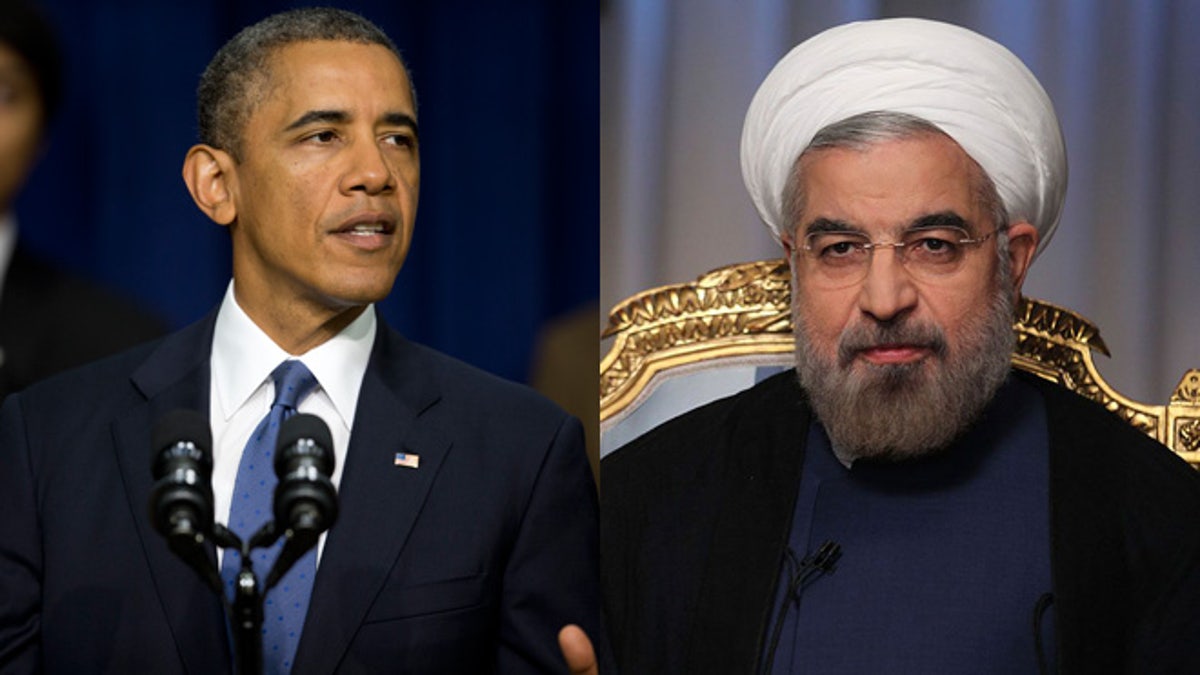
Shown here are President Obama and Iranian President Hassan Rowhani. (AP)
President Obama is acknowledging having exchanged letters with Iran's new president, raising the possibility that diplomatic talks over Iran's controversial nuclear program could be renewed on the heels of the U.S.-Russia effort to strike a chemical weapons deal with Syria.
Obama revealed his recent communication with Iran's newly elected President Hassan Rowhani in television interviews over the weekend, as he discussed the ongoing crisis in Syria. The president stated that he has been exchanging letters with Iran's president regarding possible one-on-one talks between the two governments for the first time since the Islamic Revolution of 1979.
This comes just ahead of the Iranian president's trip to New York to address the United Nations General Assembly, set to begin Sept. 24.
Many western leaders and analysts have been hopeful that Iran's new president, who ran his campaign as a "moderate," would extend a friendlier hand than his rogue predecessor Mahmoud Ahmadinejad.
In his TV interviews, Obama cautioned the Iranian regime not to draw false assumptions based on the course of events with Syria. Obama at first threatened military action against Syria for using chemical weapons, but backed off to make way for a tentative diplomatic solution -- an agreement backed by the U.S. and Russia to have the Assad regime turn over its chemical weapons to international control.
"I think what the Iranians understand is that the nuclear issue is a far larger issue for us than the chemical weapons issue, that the threat ... against Israel that a nuclear Iran poses is much closer to our core interests," the president said in a television interview that aired Sunday on ABC's "This Week."
The interview was taped before the announcement that the U.S. and Russia would work on a plan to put Syria's chemical weapons under international control.
"My suspicion is that the Iranians recognize they shouldn't draw a lesson that we haven't struck [Syria] to think we won't strike Iran. However, that what the Iranians should draw from this episode is that it is possible to resolve this type of disagreement diplomatically," he said.
"My view is that if you have both a credible threat of force, combined with a rigorous diplomatic effort, that, in fact you can ... strike a deal," he said, at that point admitting that he had exchanged letters with Rowhani.
In his interviews, Obama pointed to the Iranian regime's extensive entanglement in Syria, but also credited the Iranians for deterring Syrian President Bashar Assad from using chemical weapons.
The Iranian regime has been backing Assad throughout the 29 months of civil war against opposition forces. Rowhani went so far as to call the threat of U.S. strikes on Syria an "open violation" of international laws.
Historically, Syria and Iran became strong regional allies in the aftermath of Iran's 1979 Islamic Revolution.
Since Syria's uprising began in March 2011, the Iranian regime has provided billions of dollars in weapons, training and manpower to the Syrian regime to keep Assad in power. Currently, Iran-backed Hezbollah fighters, members of the Iranian regime's Revolutionary Guard and other volunteers are on the ground in Syria fighting rebel forces.
If such talks between the U.S. and the Iranian regime get underway, Rowhani has made it clear that his new foreign minister, Mohammad Javad Zarif, will be the front man.
The announcement that Zarif would lead any future nuclear talks was posted on Rowhani's website last week.
Zarif has already publicly acknowledged the exchange of private messages between the two countries over Syria.
An American-educated career diplomat and former Iranian ambassador to the United Nations from 2002 to 2007, Zarif was an intriguing add-on to Rowhani's cabinet. The graduate of San Francisco State University and the University of Denver, his resume and ability to speak American English perfectly make him a pivotal player in negotiations with the West.
In response to Obama's public statements, Rowhani set his own demands Friday, stating that the Iranian regime is open to resolving issues with the global community over its nuclear program, but will not "sacrifice its rights or interests" in order to do so. Meaning Rowhani's bottom line is that he will not stop the enrichment of uranium.
Rowhani, who met with Russian President Vladmir Putin Friday in Kyrgyzstan's capital, Bishkek, for a regional security summit, said it was an opportune time to take new action regarding the West's contentions over the Iranian regime's nuclear program.
"Russia in the past has taken important steps in this sphere and now is the best chance for new steps from your side," Rowhani said to Putin.
For six years, the so-called P5-plus-1 -- including the U.S., Britain, France, China, Russia and Germany -- has met without any resolution over Iran's nuclear weapons program.




